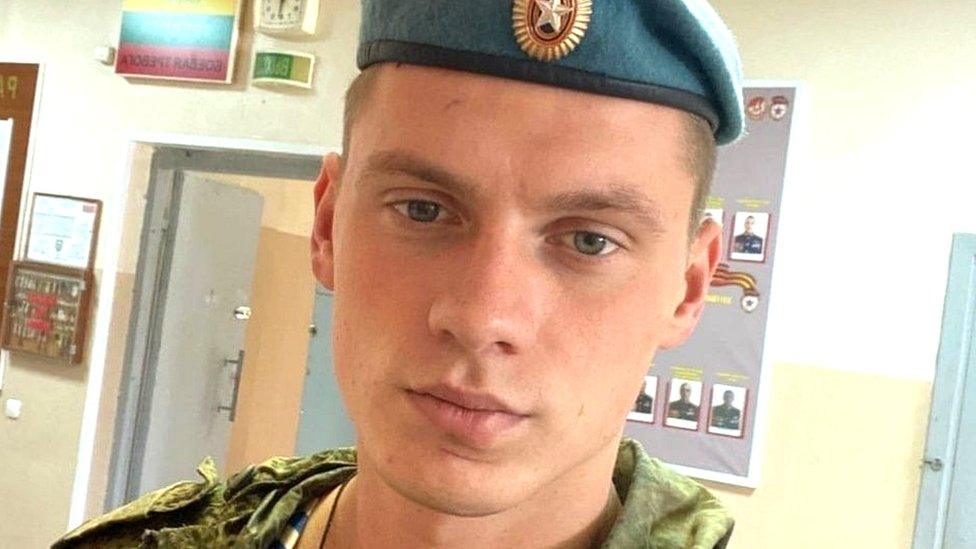Russia's elite 331st paras regiment fight for public support
- Published
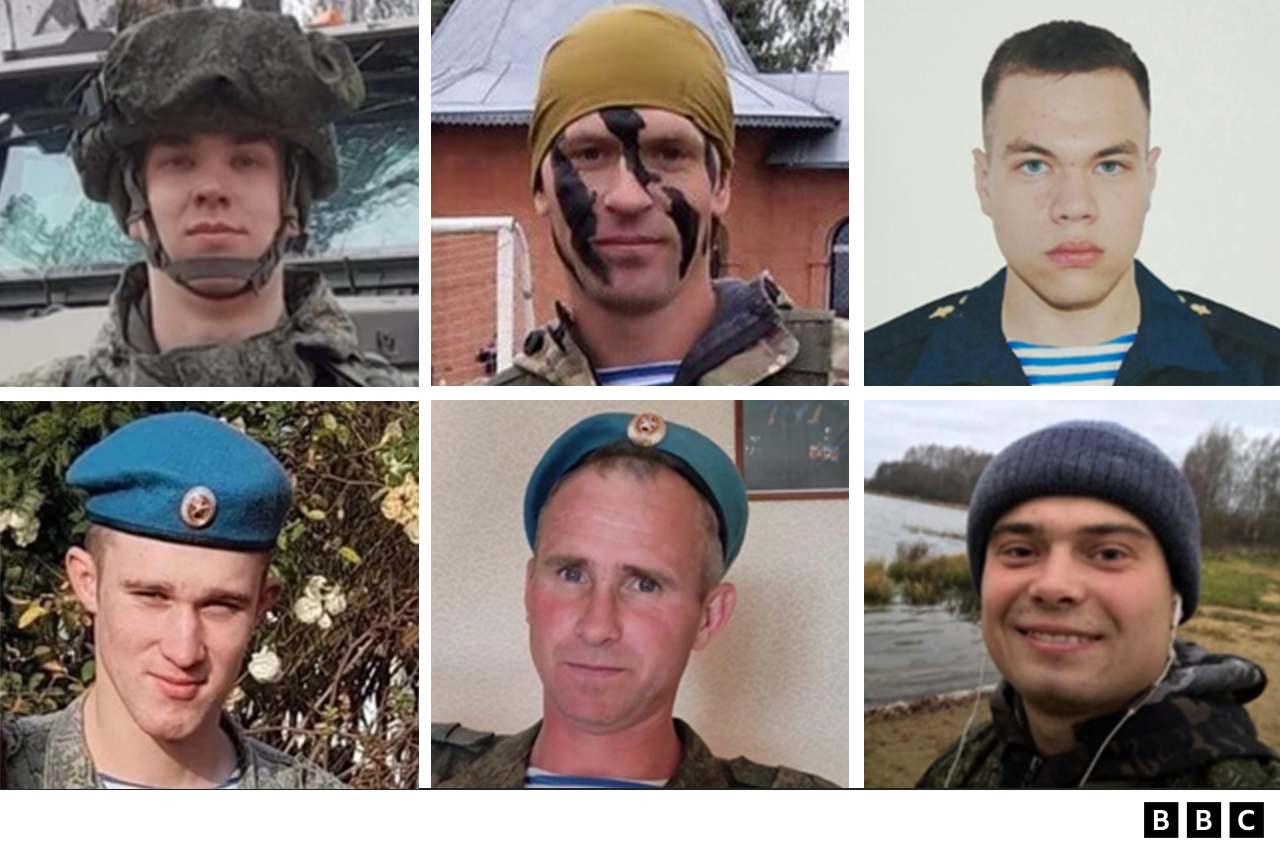
Some of the the 62 Russian soldiers from 331st regiment who are known to have died
One of Russia's elite fighting forces, the 331st Guards Parachute regiment, is back in Ukraine after suffering heavy losses at the start of the war. While state media tells a story of the unit's great heroism, back in the regiment's hometown, support for the fighters looks less certain.

In the Donbas battleground an armoured vehicle races up to a field hospital carrying several badly-injured men. "The [Ukrainian] tank was firing at us," one of the Russian paratroopers explains, as his wounds are dressed, "...first near us, then straight at us."
These glimpses of the bloody reality of this war, on the official Rossiya channel earlier in June, are rare. But acknowledgements of the price being paid by the army are becoming less so. Something else about these images caught our attention also, for the soldiers were identified on Russian social media as belonging to the 331st Guards Parachute regiment, a unit that featured in our reporting at the start of April.
In March, the 331st, based until shortly before the invasion in Kostroma, 300km (186 miles) north-east of Moscow, took heavy losses during the abortive advance on Kyiv. During the fighting of 11-14 March they were pounded repeatedly by Ukrainian artillery while trying to force their way into the town of Bucha, scene of gruesome subsequent crimes against local civilians. Among the deaths in the mid-March fighting was Colonel Sergei Sukharev, the 331st regiment's commander, several other officers and dozens of men.
Many of the soldiers were listed as "missing" - dying in circumstances, such as in blown up armoured vehicles, where recovery of their bodies was impossible. But memorial walls on Russia's Facebook-like platform V'Kontakte give a good idea of confirmed fatalities, and the anguished public reaction.
Heroes... or victims?
Monitoring the local media in Kostroma after these initial losses, it seems the Russian authorities started to have concerns about leaving the public in the dark about what was going on with the 331st. In May, a group of former officers were sent to talk to the paratroopers, returning to reassure the public on a local TV channel.
"We wanted to see for ourselves," Col Nikolai Mayorov, a retired commander of the regiment, told the interviewer. "We were convinced that their mood is fine."
And as if to address those bewildered by the purpose of this war, Mayorov added, "They know what they're doing, they know why they're doing it".
Officially sanctioned ceremonies show a street being named after Col Sukharev, a school commemorating Danil Turapov, a paratrooper killed in the same battle, or fundraisers for sending comfort packages to the soldiers. The soldiers' relatives evidently feel a strong common bond, but that's less so among the wider community.
Video from a concert put on by family of 331st regiment members, to mark Russia's annual Victory Day on 9 May, shows an exuberant performance of patriotic songs in a Kostroma public park. But the wide shots reveal almost nobody is watching.
Ambivalence or even hostility towards the war in Ukraine is also present.
One Kostroma local, who had been canvassing reactions to the town's losses in Ukraine, said: "I feel sorry for each of these boys, but I don't consider them to be heroes, I consider them to be victims."
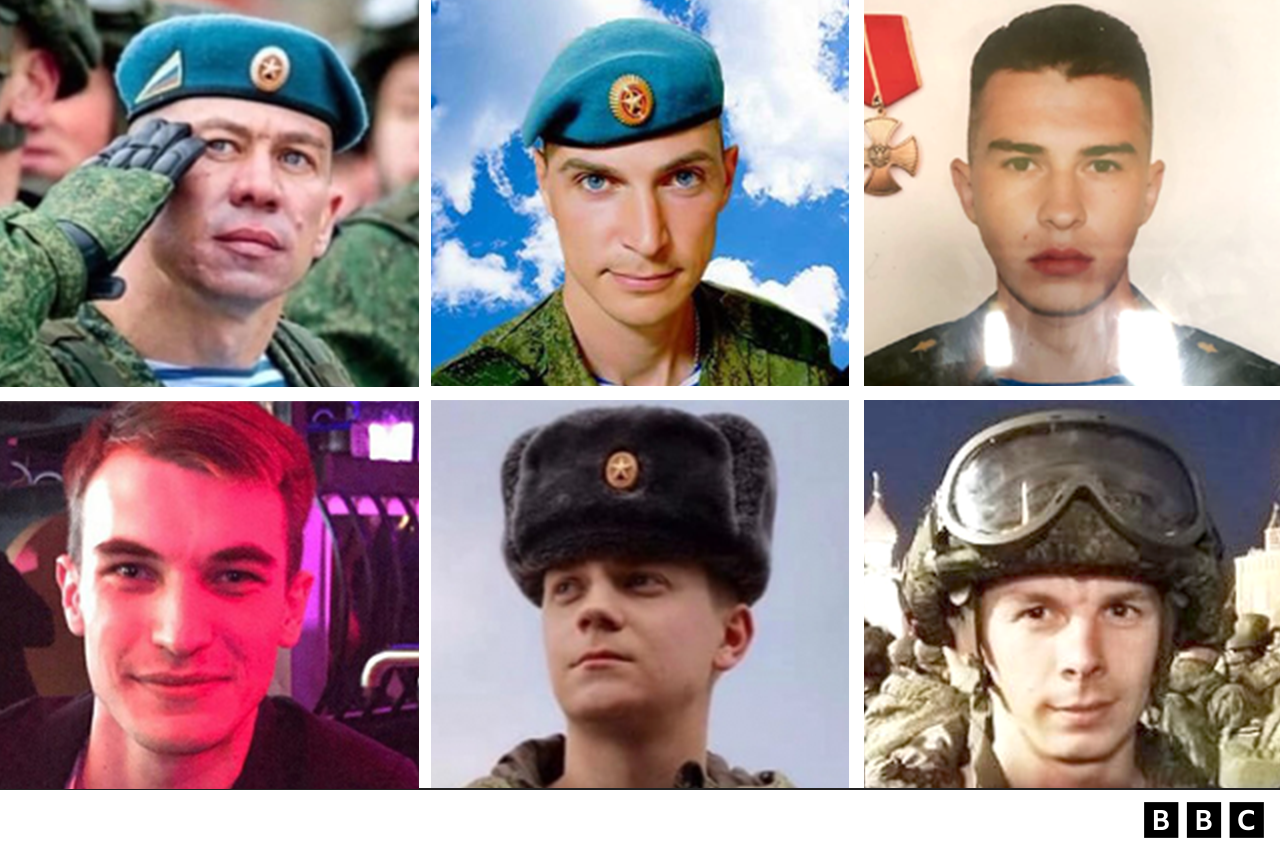
Photographs of some of the Russian soldiers from the 331st regiment who have died
From Russian reporting and other open sources it's possible to trace what happened to the paratroopers after their ill-fated drive on Kyiv. The 331st regiment, in common with thousands of other Russian troops in that part of northern Ukraine, was pulled back into neighbouring Belarus during the latter part of March.
In early April, their vehicles were filmed being loaded on to railway flatcars at Baranovichi in Belarus, from where they were taken the 1,000km or so to Belgorod, a Russian town bordering eastern Ukraine. This was part of the shift to the Donbas in the east of Ukraine.
After a period of rest there, the 331st was committed to action once more, during April's fighting near Izyum in eastern Ukraine. After weeks without fresh fatalities we started to see new entries on the social media memorial walls.
By late May, Russian attention had shifted about 100km south-east to Popasna where the invading forces started to make progress against the Ukrainian defenders.
It is in the battles in that corner of Luhansk that have raged during recent weeks, that the 331st has once again been committed and in which the remarkable footage of its men, shown on the state-controlled Rossiya TV channel, was taken.
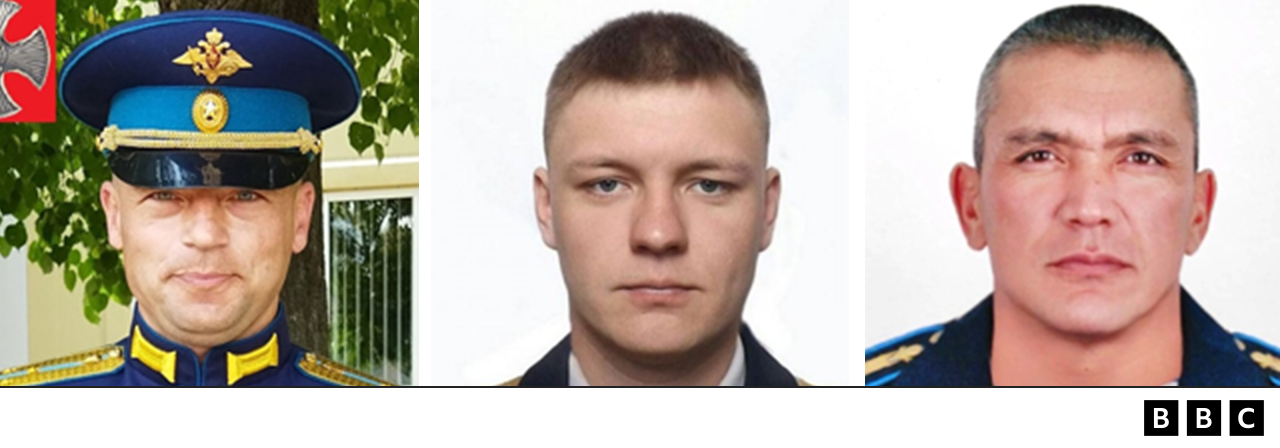
The regiment's death toll has risen by at least 23 since the BBC last reported on it in early April
The airborne combat vehicle, or to use the Russian initials, BMD, that pulls up in that footage has been daubed with so many symbols and letters that it has become a kind of tableau of the 331st and its grim collective experience.
Troops on the main advance towards Kyiv painted a white V on the sides of their vehicles, and the Kostroma regiment another stroke of paint that looks like an exclamation mark to the inverted triangle that is a standard mark and three-digit serial number. Loaded on to the flat cars after their late March return to Belarus, this is how the BMDs were marked.
But the soldiers kept adding paint, and perhaps their officers tolerated it because they thought it might keep morale up. One of the same combat vehicles we spotted on a flat car early in April in Belarus had by this month in Luhansk added a painted "Z", a favourite Kremlin symbol for the war, the words "Kostroma", and "Fighting Friend" to its sides. On top of the other symbols, the original green is almost disappearing.
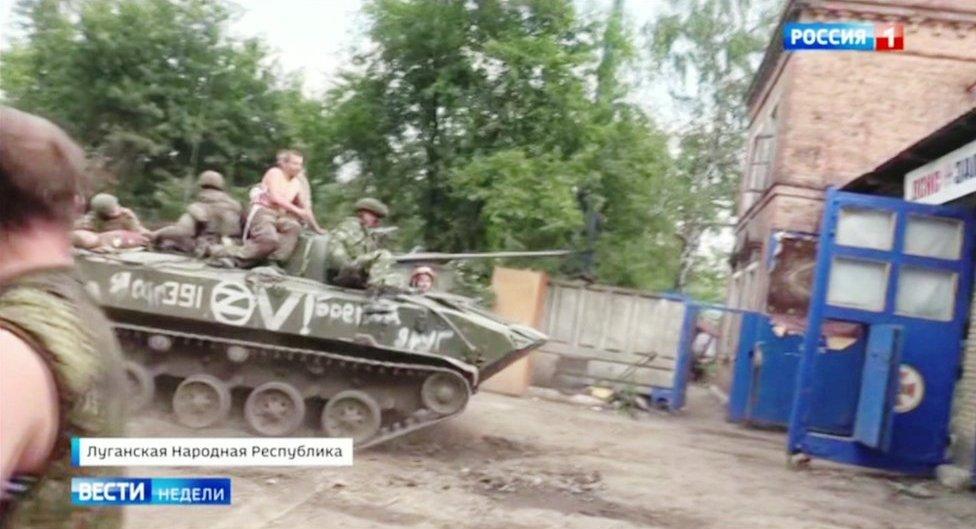
Daubed with paint - did officers tolerate the markings to keep up morale?
As for the human cost of this long fight, our tally of verified deaths in the regiment has risen from 39 early in April to 62 currently. Given the number of missing soldiers and some names not being published, the actual number lost is significantly higher and could reach 120. When one adds wounded at a ratio of three-to-one, total casualties are likely in the 400-500 bracket. This is about half of the 331st regiment's strength with which it would have entered Ukraine in February.
The impact on Kostroma is somewhat higher because the 1065th Airborne Artillery regiment, also from that town, has been fighting alongside the 331st in Ukraine, taking losses too. Local media has verified more than 80 soldiers from Kostroma have been killed in the months since late February, which compares with 56 during the Soviet Union's entire nine-year Afghanistan war.
Additional reporting by Maria Jevstafjeva
The BBC has so far verified the deaths of 62 soldiers from the 331st Guards Parachute regiment: Klim Abramov, Snr Lt Rustem Akhmedyanov, Viktor Baranchikov, Oleg Bedoshvili, Capt (Co Cdr) Yurii Borisov, Snr Lt Ilya Chernyshev, Cpl Yuri Degtaryov, Konstantin Dobrynin, Sasha Dolkin, Maksim Dubov, Sgt Sergei Duganov, Sgt Andrey Dunayev, Kiril Fedoseyev, Artur Imangulov, Lt Yury Inkin, Maksim Ivanov, Snr Lt Nikolai Kirkin, Andrey Kovalevsky, Maj Sergei Krylov, Utemes Kuanshpekov, Artem Kuprichenko, Stanislav Kutelev, Sergey Lebedev, Cpl Yanosh Leonov, Sgt Alexander Limonov, Snr WO Sergei Lobachyo, Nikita Lomakin, Pavel Makarov, Artem Makhov, Cpl Ivan Mamzurin, Cpl Ilya Martynenko, Oleg Melnikov, Comdr Vadim Netuzhilov, Sgt Aleksandr Nikitin, Alexey Ostanin, Lt Lev Ovchinnikov, Maksim Ovchinnikov, Cpl Leonid Panteleyev, Maj Oleg Patskalyev, Sgt Stanislav Petrutik, Cpl Zakhar Polevschikov, Sgt Roman Pomelov, Dmitry Prokopov, Snr WO Pavel Rudenko, Snr Lt Alexander Shalygin, Aleksey Shevelev, Egor Shukhov, Col Sergei Sukharev, Maj Evgeny Sulokhin, Maxim Svetlenko, Snr Lt Nikolai Symov, Daniil Titov, Maxim Trokai, Danil Turapov, Ivan Turyev, Snr Lt Andrei Vashkov, Sgt Maxim Vorotyntsev, Capt Alexei Vyshegorodtsev, Alexei Yelimov, Cpl Artem Yergin, Sgt Ravshan Zhakbaev, Cpl Danila Zudkov
Related topics
- Published2 April 2022
